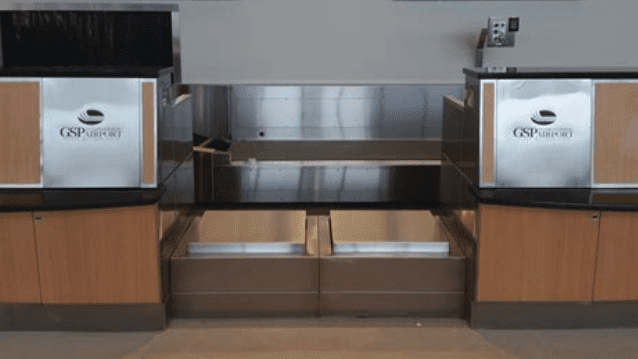When traveling, making sure your bags are no more than the maximum weight allowed is pretty important. If you’re over that 50-pound limit (well, 40 pounds for Frontier, Spirit and Allegiant, in the U.S.), you’re going to have to start moving things around so you wind up under that all-important limit (unless you’re flying in first class – if so, some airlines allow you to have a heavier bag). Or, depending on the airline, pay a fee for an overweight bag.
The thing is, you have to go by the airlines’ scales. This brings up a legit question – how accurate are their scales?
Do Airport Scales Really Work?
That’s an excellent question because if the scale is inaccurate, you might think your bag is 49 pounds, but the airline might insist it’s 51.
There’s no 100% overall answer
Unfortunately, there’s nothing standardized. Since airports are in different cities and states, with varying requirements, the scales are checked by different companies at vastly different times. Here’s what I found out for some cities and states, from dates that are, well, all over the place (you could say they’re “very different” LOL):
Boston
According to local CBS News affiliate in 2011, Boston’s Inspectional Services Department makes a surprise check on an annual basis to make sure the scales at Boston Logan are accurate. During that particular inspection CBS covered in 2011, 9 of the 23 scales failed inspection – they were all condemned.
Some of the scales were off by as much as two pounds. Others didn’t zero out (so they said there was some weight on them, even though nothing was on the scale).
The City of Boston also explained, in 2019, how they inspect airline scales to ensure accuracy.
Los Angeles
The Los Angeles Times reported in 2011 that the latest (at the time) inspection report from the Los Angeles County Weights and Measures Bureau found that 86% of the scales tested at Los Angeles International Airport were accurate to within one-tenth of a pound.
62% of scales at Long Beach Airport were accurate that year. And 71% of the scales at Bob Hope Airport were listed as accurate.
The bureau tests the scales annually. If a scale is off by more than one-tenth of a pound in the airline’s favor, bureau inspectors take the scale out of service until repaired. If a scale is off in favor of the passenger, it can still be used but must be repaired within 30 days
New York City
According to local WNBC Channel 4, “In order to ensure travelers that airport scales are indeed accurate, the New York City Department of Consumer and Worker Protection inspects scales at LaGuardia Airport and JFK Airport every two years, with permission from Port Authority officials.
They most recently (late 2024) found 2 scales out of 900 that were non-compliant. They were taken out of service and will be repaired or replaced.
(Interestingly, a Wall Street Journal article from 2009 placed errant scales at those two airports at 8%)
North Carolina
According to the Measurement Section Manager of the state of North Carolina in 2009, they use calibrated weights to make sure scales are correct, and any scale rejected by the state during inspection is taken out of service and the airline has 30 days to fix it. The state inspects airport scales once a year.
Phoenix
A report from azcentral in 2021 said that an audit determined that Arizona inspectors neglected to check the accuracy of most of the luggage scales at Phoenix Sky Harbor International Airport for five years and didn’t check any at Phoenix-Mesa Gateway Airport over the same period.
When they did look at the accuracy of the scales, inspectors found problems with a quarter of the scales they checked at Sky Harbor.
Seattle
Seattlepi reported in 2011 that 8 (out of 120) Sea-Tac airport scales flunked accuracy and compliance standards testing (4 were inaccurate readings in favor of the traveler, 4 didn’t allow you to see the weight).
Inspectors also found 1 bad scale at the Tri-Cities Airport in Pasco. All scales at the Spokane, Yakima and Walla Walla airports were in compliance.
The report didn’t include how often the scales were tested.
So, what does all this tell you?
It tells you 3 things:
- Not many news outlets report on airport scales very often. 😉
- When airport scales are inspected (ahem – or not…lookin’ at you, PHX) and by what entity varies vastly from state to state.
- There can be a good percentage of airport scales that are inaccurate at any given time.
How can you protect yourself?
Since you can’t necessarily trust airport scales, you have to take care of yourself. Here are a few pointers:
Portable Scales: A Helpful Tool
Obvious, if the American Airlines’ scale says your bag is 52 pounds, your li’l scale saying it’s 49 pounds won’t matter a bit to the representative behind the desk. But if nothing else, you can get an idea of how much your bag weighs before you get to the airport.
Strategic Packing for Weight Limits
If the limit is 50 pounds, try not to go over 47 or 48 pounds on your handheld scale. That gives you some wiggle room if their scales aren’t calibrated.
Might also be a good idea to have some extra space in your carry on so IF you need to transfer stuff from your checked bag, it can be a quick and easy process.
Ask to use a different scale
This one is iffy because it depends on the mood of the airline representative. But if you know FOR SURE that your bag weighs less than 50 pounds and their scale is saying it weighs more, politely question the calibration or most recent inspection of that particular scale and ask if your bag can be weighed on a different. Can’t hurt to ask, right?
Want to comment on this post? Great! Read this first to help ensure it gets approved.
Want to sponsor a post, write something for Your Mileage May Vary, or put ads on our site? Click here for more info.
Like this post? Please share it! We have plenty more just like it and would love it if you decided to hang around and sign up to get emailed notifications of when we post.
Whether you’ve read our articles before or this is the first time you’re stopping by, we’re really glad you’re here and hope you come back to visit again!
This post first appeared on Your Mileage May Vary
Join our mailing list to receive the latest news and updates from our team.

